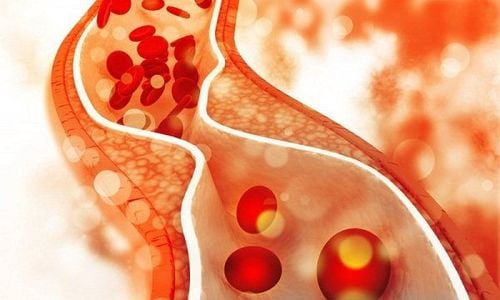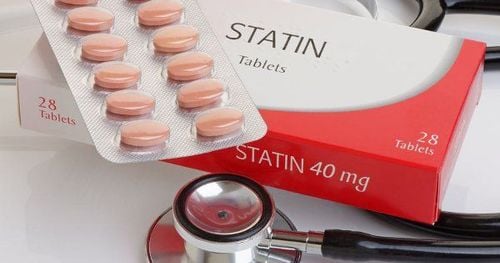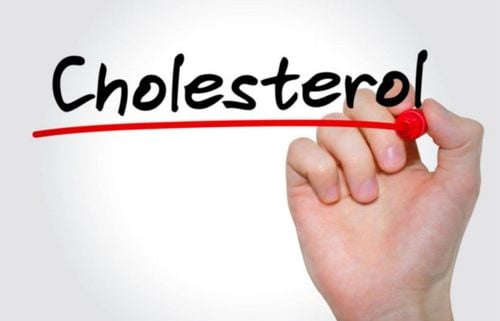This is an automatically translated article.
The article was professionally consulted by Doctor Tran Quoc Tuan - Emergency Medicine Doctor - Emergency Resuscitation Department - Vinmec Phu Quoc International General Hospital.Chicken eggs are a valuable source of human nutrition. No one denies the benefits that chicken eggs bring, but how should we eat eggs to be reasonable?
Chicken eggs are one of the most nutritious foods on earth. But when it comes to eggs, many people are afraid of the high cholesterol content in this dish. However, increasing cholesterol is not simply an increase in food intake, it is more complicated than that, because the body has its own balancing mechanism. Therefore, eating a reasonable number of eggs will not cause high cholesterol.
1. How does the body balance cholesterol levels?
When it comes to cholesterol, it often has a bad reputation, but in fact cholesterol plays an important role in the human body. Cholesterol is the building block of cells, as well as the raw material for the production of hormones such as testosterone, estrogen and cortisol. Cholesterol is so important that the body has formed a balance control mechanism, that is, when the body does not absorb cholesterol from food enough, the liver will increase cholesterol production, and vice versa, when the body absorbs excess cholesterol. , the liver will produce less. As a result, the cholesterol level needed by the body is maintained. However, when blood cholesterol levels have increased, it is necessary to limit foods high in cholesterol, because otherwise cholesterol levels in the blood can continue to rise.2. What happens if you eat a few eggs a day?
For decades, it was recommended to limit the consumption of eggs, or at least egg yolks, because of the link between eggs and cholesterol.One medium egg contains 186 mg of cholesterol - 62% of the reference daily intake (RDI), and the egg white is mostly protein and low in cholesterol.
A few studies have examined the effects of eggs on cholesterol levels. These studies assigned participants to two groups, one that ate 1 to 3 eggs per day (eating whole eggs), and another group that ate something more (eg, fortified eggs). Research results show that:

Một quả trứng cỡ trung bình chứa 186 mg cholesterol - chiếm 62% khẩu phần hàng ngày
In 70% of participants, eggs had no effect on total cholesterol or LDL cholesterol. Concentrations of these substances in the remaining 30% of people increased slightly.
Although eating a few eggs a day can increase blood cholesterol levels in some people, the size of LDL cholesterol fragments also varies from small to large. People whose LDL cholesterol is predominantly large face a lower risk of heart disease. So even if eating a few eggs raises total cholesterol and LDL cholesterol, it is not cause for concern.
Final conclusions have shown that eating up to 3 eggs a day (eating whole eggs) is still perfectly safe for healthy people.
3. Eggs and heart disease
Many studies have focused on clarifying the link between egg consumption and cardiovascular disease risk, many of them observational studies with large groups over many years.Researchers use statistical methods to determine if certain habits, such as diet, smoking or exercise, are linked to certain diseases.
Results from these studies (some very large studies with hundreds of thousands of participants) have shown that people who eat whole eggs have almost no increased risk of cardiovascular disease compared with those who do not. do not eat. In addition, some studies have shown a reduced risk of stroke.
But the study results also suggest that people with type 2 diabetes who eat a lot of eggs will have an increased risk of cardiovascular disease.
A controlled study in people with type 2 diabetes showed that eating two eggs a day, six days a week for three months had no significant effect on blood fat levels.
Remember, not only eggs but all other foods will have different effects on health.
4. Other benefits of eating eggs

Những lợi ích khác từ việc ăn trứng
Eggs are high in lutein and zeaxanthin, antioxidants that help reduce the risk of eye diseases like macular degeneration yellow or cataracts. Eggs are rich in choline, a nutrient that plays an important role in every cell. Eggs are rich in animal protein, which helps to increase muscle mass and strengthen bones. Eggs help increase the feeling of fullness, thereby helping to lose weight. In addition, eggs have a delicious taste and are convenient for cooking. The benefits of eggs are many and far outweigh the potential risks.
5. So how many eggs is too much?
There are currently no studies directed at eating more than 3 eggs per day.Therefore, there is no recommendation and the benefits/disadvantages of consuming more than 3 eggs per day are unknown.
One thing to keep in mind is that not all eggs are created equal. Most eggs sold in supermarkets are industrial eggs, and the type of eggs that give the best benefits are eggs fortified with omega-3 or naturally raised eggs. These eggs are rich in omega-3 and fat-soluble vitamins.
To sum up, eating eggs is completely safe for human health, with recommendations to limit eating to 3 eggs per day (eat whole eggs).
Doctor Tran Quoc Tuan has 12 years of experience at Vinh Long General Hospital, Gia Dinh People's Hospital, Nguyen Trai Hospital. Currently working as an Emergency Resuscitation Doctor at Vinmec Phu Quoc International General Hospital.
Please dial HOTLINE for more information or register for an appointment HERE. Download MyVinmec app to make appointments faster and to manage your bookings easily.
Article referenced source: Healthline.com












